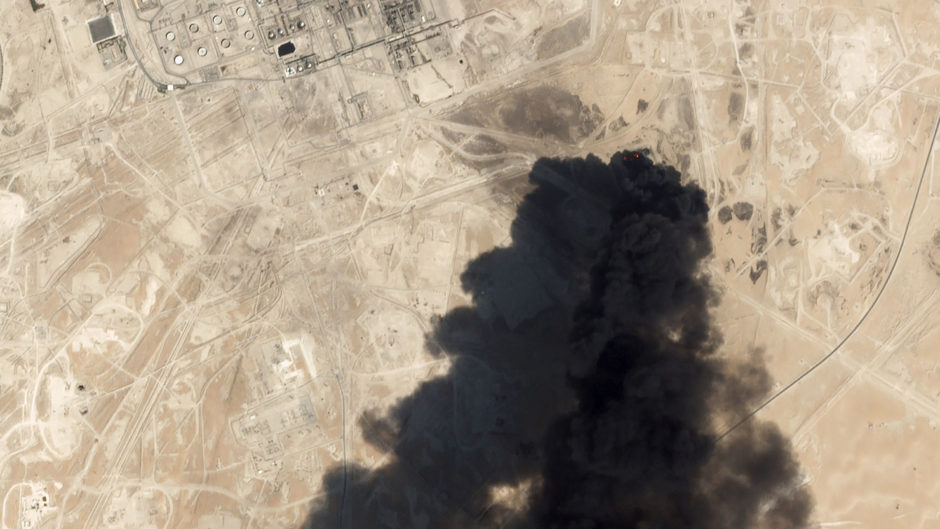
An attack on Saudi Arabia’s oil industry came “from the north” and was “unquestionably sponsored by Iran”, a military spokesman has said.
Colonel Turki al-Maliki, speaking at a news conference Wednesday in Saudi capital Riyadh, did not elaborate, but to the north across the Persian Gulf are Iraq and Iran.
The military also showed journalists what they described as an Iranian cruise missile and drones used in the attack.
Officials said the missile, which had what appeared to be a jet engine attached to it, was a land attack cruise missile that failed to explode.
Saturday’s attack struck the world’s biggest oil processing facility as well as an oil field. Yemen’s Houthi rebels claimed the assault, but the US alleges Iran was behind it.
Iran has warned the US that any action against it will “immediately” be met with a response from Tehran, its state-run news agency has reported.
Iran’s president and foreign minister also may skip next week’s high-level meetings at the United Nations as the US has yet to issue them visas, IRNA reported.
The UN meeting had been considered as an opportunity for direct talks between Iranian President Hassan Rouhani and President Donald Trump amid a summer of heightened tensions and attacks after America’s unilateral withdraw from Iran’s nuclear deal with world powers a year ago.
However, the attack in Saudi Arabia and hardening comments from Tehran suggest such talks are increasingly unlikely.
Iran sent a note through Swiss diplomats on Monday reiterating that Tehran denies being involved in the Saudi attack, IRNA reported.
“If any action takes place against Iran, the action will be faced by Iran’s answer immediately,” IRNA quoted the note as saying.
IRNA separately reported that Iran’s first delegation for the annual UN event had not left Tehran due to not having visas. Foreign minister Mohammad Javad Zarif was due to travel to New York on Friday, with Mr Rouhani following on Monday, according to the agency.
As the host of the UN’s headquarters, the US is mandated to offer world leaders and diplomats visas to attend meetings there, but as tensions have risen, the US has put increasing restrictions on Iranians like Mr Zarif.
US secretary of state Mike Pompeo is travelling to Saudi Arabia for meetings after Saturday’s attack on a Saudi oil field and the world’s largest crude oil processing plant.
Saudi Arabia also said on Wednesday that it had joined a US-led coalition to secure the Middle East’s waterways amid threats from Iran, while Mr Rouhani told Saudi Arabia it should see the attack as a warning to end its years-long war in Yemen.
The state-run Saudi Press Agency quoted an unnamed official saying the kingdom had joined the International Maritime Security Construct.
Australia, Bahrain and the UK had already joined the mission.
The coalition aims to secure the broader Persian Gulf region. It includes surveillance of the Strait of Hormuz, the narrow mouth of the Persian Gulf through which a fifth of the world’s oil travels, and the Bab el-Mandeb, another narrow strait that connects the Red Sea and the Gulf of Aden off Yemen and east Africa.
Smaller patrol boats and other craft will be available for rapid response. The plan also allows for nations to escort their own ships through the region.
The US blames Iran for apparent limpet mine explosions on four vessels in May and another two in June sailing in the Gulf of Oman near the Strait of Hormuz, something Tehran denies. Iran also seized a British-flagged oil tanker and another based in the United Arab Emirates.